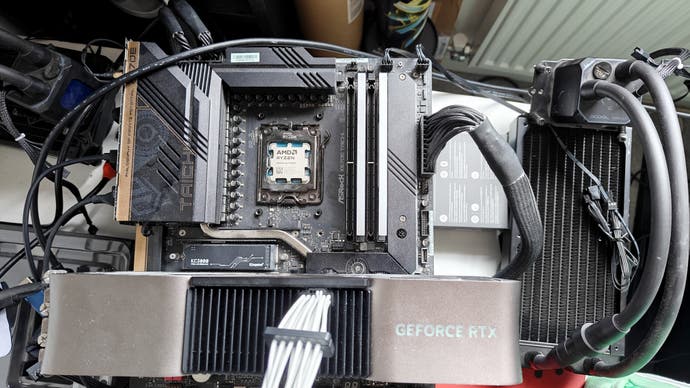It's been a rough old time when it comes to benchmarking CPUs, I can tell you that. The Ryzen 9000 release back in August was let down by relatively meagre performance improvements and an unready software ecosystem, while Intel's 285K and 245K launch last month showed a significant performance regression versus 14th-gen - despite a genuinely interesting shift in architectures. Thankfully, AMD is here to save the day with the Ryzen 9 9800X3D.
As you might expect, the 9800X3D is the fastest gaming CPU we've ever tested, but what you might not expect is just how much faster it can be in some titles versus the 7800X3D, 9700X and 14900K - and how much of a step forward it is outside of games versus its X3D predecessor.
What I particularly like about the 9800X3D is that it does something a bit different to the 7800X3D and 5800X3D before it. Rather than adding on the extra L3 cache above the CCD, AMD has popped it underneath this time around, a move that sees temperatures go down and clock speeds go up. The result is a chip that is a much better all-rounder than its predecessors, while still delivering the kind of game-changing performance that makes X3D chips worth waiting for.
To properly get to grips with the level of performance on offer, we've run the 9800X3D through our full gamut of 11 game benchmarks at 1080p, 1440p and 4K, including some of the most demanding single-player (Dragon's Dogma, Starfield, Cyberpunk) and multiplayer (CS2, F1 24) releases. Our power analysis and DDR5 testing also returns from our recent Intel Core Ultra 200S reviews.
Before we get into all that though, it's worth taking a closer look at the specs here - and whether the changes we see versus the 7800X3D and 9700X are reflected in our synthetic and content creation benchmarks.
In short, the 9800X3D offers higher base clock speeds and much more L3 cache than the 9700X, but it's also worth noting that the TDP has climbed to 120W - versus 65W and optionally 105W - for the 9700X. Boost speeds are still 300MHz slower on the X3D chip, but versus the 7800X3D it's clear that the new on-bottom V-Cache location has delivered some nice gains - plus 500MHz (!) when it comes to base clock and plus 200MHz when it comes to boost. For context, we only saw a 100MHz leap in boost clock when going from the 7700X to the 9700X, so that new design does make itself known.
This is also the most expensive Ryzen 7 X3D chip ever shipped, with a $479 RRP versus the $449 7800X3D and 5800X3D - though (potentially deliberate) supply issues have meant that the 7800X3D is far from the bargain it once was.
| Ryzen 9 9950X | Zen 5 16C/32T | 5.7GHz | 4.3GHz | 64MB | 170W | £555/$584 |
| Ryzen 9 9900X | Zen 5 12C/24T | 5.6GHz | 4.4GHz | 64MB | 120W | £383/$383 |
| Ryzen 7 9800X3D | Zen 5 8C/16T | 5.2GHz | 4.7GHz | 96MB | 120W | $479 |
| Ryzen 7 9700X | Zen 5 8C/16T | 5.5GHz | 3.8GHz | 32MB | 65W | £309/$324 |
| Ryzen 5 9600X | Zen 5 6C/12T | 5.4GHz | 3.9GHz | 32MB | 65W | £229/$249 |
| Ryzen 9 7950X3D | Zen 4 16C/32T | 5.7GHz | 4.2GHz | 128MB | 120W | £550/$595 |
| Ryzen 9 7950X | Zen 4 16C/32T | 5.7GHz | 4.5GHz | 64MB | 170W | £429/$487 |
| Ryzen 9 7900X3D | Zen 4 12C/24T | 5.6GHz | 4.4GHz | 128MB | 120W | £443/$569 |
| Ryzen 9 7900X | Zen 4 12C/24T | 5.6GHz | 4.7GHz | 64MB | 170W | £323/$395 |
| Ryzen 7 7800X3D | Zen 4 8C/16T | 5.0GHz | 4.2GHz | 96MB | 120W | £398/$476 |
| Ryzen 7 7700X | Zen 4 8C/16T | 5.4GHz | 4.5GHz | 32MB | 105W | £264/$269 |
| Ryzen 5 7600X | Zen 4 6C/12T | 5.3GHz | 4.7GHz | 32MB | 105W | £189/$207 |
| Ryzen 5 7600 | Zen 4 6C/12T | 5.1GHz | 3.8GHz | 32MB | 65W | £167/$198 |
 A very clean and not at all dusty test rig, featuring a Ryzen 9000 processor, RTX 4090 Founders Edition, ASRock Taichi X670E and the Alphacool Aurora Eisbaer 240mm AiO. | Image credit: Digital Foundry
A very clean and not at all dusty test rig, featuring a Ryzen 9000 processor, RTX 4090 Founders Edition, ASRock Taichi X670E and the Alphacool Aurora Eisbaer 240mm AiO. | Image credit: Digital Foundry
All testing was performed on fresh installs of Windows 24H2 with the latest chipset drivers, BIOS updates and Nvidia's 565.90 graphic drivers installed (to allow us to reuse the mountain of data we collected for our Core 285K and 245K reviews). Resizable BAR and core isolation were enabled on each system.
Our CPU test platform is based around the Nvidia GeForce Nvidia GeForce RTX 4090 Founders Edition graphics card and Trident Z5 Neo DDR5-6000 CL30 RAM. Each CPU is accompanied by a 1000W+ power supply from Corsair or NZXT, a high-end 240mm or 360mm AiO and a suitable premium motherboard: the ASRock X670E Taichi for AMD Ryzen 7000 and 9000, the MSI Z890 Meg Ace for Intel Core Ultra 200S, the Gigabyte Aorus Z790 Master for 12th and 14th-gen Intel Core and the Asus ROG Crosshair 8 Hero for AMD Ryzen 5000 - with Trident Z Royal DDR4-3600 CL16 as DDR5 RAM is not supported on this platform.
Storage duties are handled by a range of PCIe 4.0 or PCIe 5.0 SSDs, including the 4TB Lexar NM790 for our AMD Ryzen 9000 system.
Now, let's move onto the content creation benchmarks to get a better sense of how the 9800X3D advances on its predecessors. Even if you don't plan to use the 9800X3D to crank out videos or do 3D modelling, this sort of testing also sets out the maximum uptick we're likely to see in gaming workloads and gives you a more general sense of all-core performance.
| Ryzen 5 3600X | 77 | 578 | 485 | 3654 |
| Ryzen 7 5800X3D | 95 | 915 | 546 | 5746 |
| Ryzen 9 5900X | 98 | 1171 | 610 | 8393 |
| Ryzen 5 7600X | 114 | 845 | 744 | 5814 |
| Ryzen 7 7700X | 118 | 1127 | 758 | 7609 |
| Ryzen 7 7800X3D | 112 | 1074 | 688 | 6988 |
| Ryzen 9 7900X | 116 | 1605 | 776 | 11196 |
| Ryzen 9 7950X | 121 | 2004 | 784 | 14272 |
| Ryzen 5 9600X | 132 | 935 | 850 | 6358 |
| Ryzen 7 9700X | 130 | 1172 | 862 | 7851 |
| Ryzen 9 9800X3D | 134 | 1342 | 823 | 8938 |
| Ryzen 9 9900X | 135 | 1784 | 879 | 12617 |
| Ryzen 9 9950X | 138 | 2235 | 866 | 15850 |
| Core i5 14600K | 120 | 1400 | 777 | 9420 |
| Core i7 14700K | 127 | 1987 | 818 | 13614 |
| Core i9 14900K | 133 | 2107 | 875 | 15297 |
| Ultra 5 245K | 128 | 1435 | 841 | 9864 |
| Ultra 9 285K | 144 | 2386 | 895 | 16055 |
Starting with our Cinebench test results, including the popular R20 and more recent 2024 release, the 9800X3D shows a small uptick in single-core performance (130 vs 134) and a much larger ramp up in multi-core performance (1342 vs 1172) versus the 9700X, most likely attributable to its higher power limits. Note that we tested the 9700X at its stock 65W setting, though a 105W mode was made available later and in our 9700X review we saw it deliver similar performance to the 9800X3D - 136 single, 1280 multi.
The bigger differential comes when examining the 9800X3D versus the 7800X3D. Here, scores are up around 20 percent for single and 25 percent multi-core in the two Cinebench versions, putting the 9800X3D half-way between the eight-core 7700X and 12-core 7900X - not bad.
While Cinebench is meant to reflect a 3D modelling and animation task in Cinema 4D, our Cinebench test reflects a real use case for us: transcoding a Patreon video file into H.264 and H.265 (HEVC). Here, we measured the 9800X3D sucking down a healthy 259W at full tilt, versus the 191W-max 9700X, but the new CPU also turns in an impressive 59.59fps H.264 and 27.44fps HEVC average transcode frame-rate. That's 15 percent faster than the 9700X, admittedly while drawing 35 percent more power.
| Ryzen 5 3600X | 26.66 | 10.80 |
| Ryzen 7 5800X3D | 42.00 | 18.71 |
| Ryzen 9 5900X | 57.59 | 23.83 |
| Ryzen 5 7600X | 41.29 | 18.31 |
| Ryzen 7 7700X | 53.27 | 23.65 |
| Ryzen 7 7800X3D | 49.63 | 21.54 |
| Ryzen 9 7900X | 78.35 | 32.59 |
| Ryzen 9 7950X | 98.58 | 41.68 |
| Ryzen 5 9600X | 42.51 | 19.77 |
| Ryzen 7 9700X (191W max) | 51.80 | 23.79 |
| Ryzen 7 9800X3D (259W max) | 59.59 | 27.44 |
| Ryzen 9 9900X | 82.96 | 35.33 |
| Ryzen 9 9950X | 103.25 | 44.97 |
| Intel Core i5 14600K | 59.42 | 25.39 |
| Intel Core i7 14700K | 80.26 | 31.07 |
| Intel Core i9 14900K (476W max) | 85.06 | 35.08 |
| Intel Ultra 5 245K (286W max) | 61.05 | 26.88 |
| Intel Ultra 9 285K (362W max) | 97.17 | 38.44 |
Comparisons versus the 7800X3D are also impressive, with a 27 percentage point advantage in the HEVC test. We're still some way from the likes of the 12-core and 16-core AM5 designs, but it's still an impressive showing for a gaming-focused part and one that proves the efficacy of AMD's new bottom-cache design.
Now let's get into the turkey and Yorkshire puddings of our testing, the gaming benchmarks. We have 11 games in all.
AMD Ryzen 7 9800X3D analysis
- Introduction, test rig and content creation benchmarks [this page]
- Gaming benchmarks: Dragon's Dogma 2, Baldur's Gate 3, Starfield
- Gaming benchmarks: Flight Simulator 2020, F1 24, Forza Horizon 5
- Gaming benchmarks: Counter-Strike 2, Cyberpunk 2077, Crysis 3 Remastered
- Gaming benchmarks: Far Cry 6, Hitman World of Assassination
- Power analysis: Counter-Strike 2, Far Cry 6, Forza Horizon 5
- RAM gaming benchmarks: Cyberpunk 2077, Far Cry 6, Flight Sim 2020
- AMD Ryzen 7 9800X3D: the Digital Foundry verdict

 3 months ago
177
3 months ago
177








![Anime Reborn Units Tier List [RELEASE] (November 2024)](https://www.destructoid.com/wp-content/uploads/2024/11/anime-reborn-units-tier-list.jpg)
